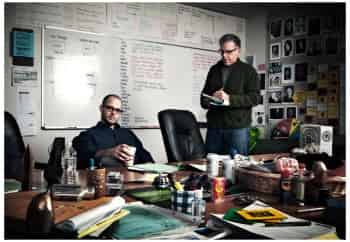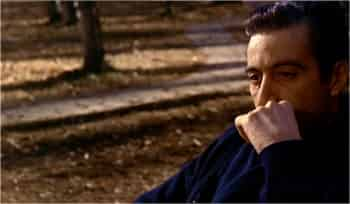Bonus
-
The Effect of Water
One does not emerge from water magically dry.
-
Damon Lindelof and Carlton Cuse
We just received a copy of the Lost Encyclopaedia, so this seems like a good time to bring up again how much we admire this TV series. It’s popular culture at its best. We make the distinction of popular culture because some people say the series wasn’t as good as The Sopranos or Mad Men. We agree. But these two series were broadcast on specialty channels and were aimed at a more specific audience. Lost was broadcast on a major network, which imposed certain restrictions on the series. But those restrictions didn’t stop the two executive producers from making their narrative as complex as it was, which also made it denser and richer. They managed to balance emotion and action. They included all kinds of references into their stories without beating us over the head with them. We’re not saying it was perfect, and only time will tell if it will age well, but for now, let’s call it excellent scriptwriting.
-
Dead is Dead!
Dead is dead. A bullet to the head causes death. And unless the death isn’t completely obvious (for example, if there’s no body in evidence), no one comes back from the dead. Unlike Superman, or more recently, Captain America. We knew they’d be back. And how many times have Magneto, Doctor Doom and The Leader “died”? Too many for death to still be truly believable or for resurrection to surprise anyone.
-
Why Villains?
Let’s talk about villains again. We’re convinced that every good story is based on a conflict, regardless of its form. In an oversimplified schema, the conflict pits good guys against bad guys. But how do we, the audience, distinguish between the two? Much too often, to help the audience make that distinction, the bad guys are made to dress in dark clothes or they are shown smoking. But do the bad guys know their actions are bad? Actor Will Smith was vilified a few years ago for saying that Hitler wasn’t conscious of his actions being evil. We agree. We believe that villains are profoundly convinced that they are doing the right thing for their own well-being or that of those around them. We’ve already talked about how the grey areas in the heroes’ personality create ambiguity that makes the conflict truly interesting. This is superbly illustrated by the decline of Michael Corleone in “The Godfather: Part II.”
-
Maintaining Credibility
The Web gives us an incredible amount of information that can help us create more realistic worlds, but this option has limits. Originally, “Baptism of Fire” was supposed to take place in Vienna, but that created difficulties for the choreographing of the car chase. So we moved the action to Bordeaux, a city that we’ve visited and are familiar with.




